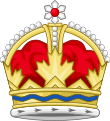 |
|---|
Canadian Senate divisions refers to two aspects of the Senate of Canada. First, it refers to the division of Canada into four regional Senate divisions of 24 senators each, as set out in section 22 of the Constitution Act, 1867.[1] The four regions are the Western Provinces, Ontario, Quebec and the Maritimes. These regions are intended to serve the Senate's purpose of providing regional representation in the Parliament of Canada, in contrast to the popular representation that the House of Commons is intended to provide.[2] While not within any of the original four Senate divisions, Senate seats are also allocated to Newfoundland and Labrador and the three territories.[3][2] The four divisions can be expanded when the need arises to have an extra two senators appointed to each regional division.
Second, it refers to divisions within a province represented by senators from the Canadian Senate, also known as "senatorial designation". Under the Constitution, only Quebec has official Senate divisions for each of the senatorial designations within the province.[3] In all other provinces, senators are appointed to represent the province as a whole and the Constitution makes no reference to official senatorial designations for those provinces. Senators from provinces outside Quebec may simply "designate" a district they wish to symbolically represent within their province, which can be named at the time of their appointment or at a later time.[4] These senate divisions have no specific geographic boundaries though their names often give a reference to a general geographic area. However a senator will sometimes create boundaries for their senate division even though it has no legal status. While relatively rare, a senator outside of Quebec can change his or her division in the same manner as party affiliation, simply by notifying the Clerk of the Senate.
- ^ The Constitution Act, 1867, 30 & 31 Vict., c. 3, s. 22 (U.K.).
- ^ a b Parliamentary and Information Research Service (2009-08-10). "Publication No. 2009-02-E - Reforming the Senate of Canada: Frequently Asked Questions" (PDF). Library of Parliament. Retrieved 2011-07-05.[permanent dead link]
- ^ a b See list of Canadian constitutional documents for details.
- ^ Hynes, Aaron (2010). "Toward a Rational Redistribution of Seats in Canada's Senate" (PDF). Canadian Parliamentary Review (Winter 2010). Parliament of Canada: 27–31. Retrieved 2011-09-07.
